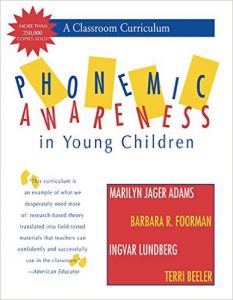Cracking the Code of Early Literacy: What Is Phonemic Awareness and Why Does It Matter?
Tuesday, January 17, 2017 7-8pm EST
 In this session, we will explore an important, often-discussed, and often-misunderstood building block of early literacy: phonemic awareness. What is phonemic awareness exactly, and why is it so important for children’s reading development? How is it different from phonological awareness and phonics? To answer these questions, we will discuss research on the role of phonemic awareness in learning to read, how phonological awareness and phonemic awareness develop over time, and the reasons that both children AND teachers often struggle with phonemic awareness in the classroom. In the context of the Michigan state ELA standards, we will discuss how to assess phonemic awareness and key instructional activities that build phonemic awareness.
In this session, we will explore an important, often-discussed, and often-misunderstood building block of early literacy: phonemic awareness. What is phonemic awareness exactly, and why is it so important for children’s reading development? How is it different from phonological awareness and phonics? To answer these questions, we will discuss research on the role of phonemic awareness in learning to read, how phonological awareness and phonemic awareness develop over time, and the reasons that both children AND teachers often struggle with phonemic awareness in the classroom. In the context of the Michigan state ELA standards, we will discuss how to assess phonemic awareness and key instructional activities that build phonemic awareness.
Recommended Reading: Phonemic Awareness in Young Children by Marilyn Jager Adams, Barbara Foorman, Ingvar Lundberg, and Terri Beeler
 Laura Tortorelli received her Ph.D. in reading education from the University of Virginia in 2015 and is currently an assistant professor in the Teacher Education department at Michigan State University. Her research examines the context in which children develop into proficient readers and writers in the early elementary grades, with a focus on how word recognition and writing skills develop from Prekindergarten to 3rd grade. She draws on developmental perspectives (Chall, 1986; Ehri, 2005; Sharp, Sinatra, & Reynolds, 2008) and the RAND model (RAND Reading Study Group, 2002) of reading comprehension to highlight how reader, text, and task factors interact in an iterative process that shapes reading development over time. She has recently been named the 2016-2017 Jeanne S. Chall Visiting Researcher by Harvard School of Education and an Emerging Scholars Fellow by the Hall of Reading Fame. Her current projects analyze writing in Prekindergarten, alphabet knowledge in kindergarten, and interactions between reading fluency and text complexity in second grade. In addition, Dr. Tortorelli is beginning a year-long collaboration with teachers in the Flint Community Schools to support their early literacy instruction.
Laura Tortorelli received her Ph.D. in reading education from the University of Virginia in 2015 and is currently an assistant professor in the Teacher Education department at Michigan State University. Her research examines the context in which children develop into proficient readers and writers in the early elementary grades, with a focus on how word recognition and writing skills develop from Prekindergarten to 3rd grade. She draws on developmental perspectives (Chall, 1986; Ehri, 2005; Sharp, Sinatra, & Reynolds, 2008) and the RAND model (RAND Reading Study Group, 2002) of reading comprehension to highlight how reader, text, and task factors interact in an iterative process that shapes reading development over time. She has recently been named the 2016-2017 Jeanne S. Chall Visiting Researcher by Harvard School of Education and an Emerging Scholars Fellow by the Hall of Reading Fame. Her current projects analyze writing in Prekindergarten, alphabet knowledge in kindergarten, and interactions between reading fluency and text complexity in second grade. In addition, Dr. Tortorelli is beginning a year-long collaboration with teachers in the Flint Community Schools to support their early literacy instruction.
